Research Experience for Undergraduates
We are excited to offer a paid summer Research Experience for Undergraduates (REU) in the cutting-edge areas of VLSI circuit design, nanofabrication, and quantum computing. This program is a 10-week research internship where each student will be mentored by faculty and graduate students and experience hands-on circuit research and convergent engineering in action. You will also join a vibrant community of other REU students at the University of Washington and participate in weekly career development sessions, interact with industry and gain experience presenting your work at a research symposium that highlights your summer accomplishments.
The UW Department of Electrical & Computer Engineering (UW ECE) has partnered with Intel to offer this 10-week Research Experience for Undergraduates (REU) on the University of Washington Seattle campus. Our program provides undergraduate students with opportunities to work on research projects with engineers and scientists and to take part in workshop training sessions in industry careers, communication and presentation skills – all designed to provide the undergraduates with a solid foundation for graduate study leading to academic or industry careers. Undergraduates will help with research in one of the labs at the UW.
The summer 2023 ECE Intel REU program will start on Tuesday, June 13, 2023 and end on Friday, August 18, 2023.

Selected students will receive:
| REU Student Stipends (10 weeks x $650/week, or current NSF rate) | $6,500 |
| REU Student Travel to UW in Seattle (up to) | $750 |
| REU Student Housing in on-campus dormitories (10 weeks) | No cost to REU student |
Applications are now open and are due January 15, 2023 for summer 2023 REUs.
Eligibility Details
Applications must be rising junior or senior undergraduates (during the summer program) in technical fields such as ECE, CSE, BioE and Physics and related fields.
Additional REU Program Requirements
Applicants must:
- Be a student at a college or university in the United States; students who have graduated from college before the start of the REU program are not eligible
- Be 18 years old by the first day of the REU program
- Be a U.S. citizen or a permanent resident of the U.S. (or its territories)
- Devote 40 hours per week to the program
- Not enroll in classes or hold other jobs during the day. Participants will be paid a stipend and will not receive academic credit for the research experience
- Attend required weekly communications classes, lectures, seminars, focus groups, and workshops
The University of Washington also requires that UW personnel and students be vaccinated against COVID-19.
If you have additional questions about the ECE Intel REU program, please contact Dr. Eric Chudler (chudler@uw.edu)
Example Summer REU Projects
Silicon Photonics Layout Automation and Device Design (Mentor: Sajjad Moazeni)
The advent of large neural networks for complex tasks such as natural language processing (NLP), autonomy, etc. is demanding data communication bandwidths for processors and accelerator chips. This can be only supported with advanced co-packaged optics using emerging silicon photonics platforms. In this project, REU students will be mentored both by PIs and graduate students to learn essential skills to design photonic devices and automate the layout design (in Python and SKILL scripts) to enable future photonic VLSI integrated systems.
Hybrid computing using phase-change photonics in CMOS for AI/ML acceleration (Mentors: Sajjad Moazeni and Mo Li)
The goal of this project is to develop a novel optical neural network (ONN) co-processor that can be 3D integrated with CPU/GPUs to bridge this gap. Hypothesis in this research would be that if ONNs can boost AI/ML computing speed at high accuracy rates and what the energy/area trade-offs would be compared with today’s technologies. REU students will be mentored both by PIs and graduate students to learn essential skills from system-level and device simulations to hands-on experience of device characterization in the lab.
Synchronize multiple instruments for nanofabrication (Mentor: Karl Böhringer)
We integrate the concept of metasurfaces and electrostatic microelectromechanical systems (MEMS) to construct a miniature varifocal composite lens based on the Alvarez tuning principle. Such a MEMS Alvarez metalens can generate fast and controllable optical modulation with compact volume and low power consumption, making it desirable for 3D imaging and depth-sensing applications such as realizing mixed reality displays and ultra-compact endoscopes. We conduct device design and fabrication inside the cleanroom (current state) and perform the optical performance analysis in an optics lab. The REU student will learn how to set up optics experiments and apply their programming knowledge to synchronize multiple instruments and automate the data acquisition process.
Programmable gate array using wide band-gap phase change material integrated silicon photonics (Mentor: Arka Majumdar)
We are developing a programmable gate array using non-volatile phase change materials integrated with silicon photonics. These devices are electrically reconfigurable, and thus it is possible to create truly programmable photonics. Existing phase change materials, however, have strong absorptive loss. Using wide bandgap phase change materials, we have recently demonstrated much lower loss operation, while maintaining reversible phase transition with high endurance. The REU student will learn how to probe these integrated photonic devices (optical measurements and electrical control), and learn about designing these devices.
Ion Trap Design for Large-Scale Quantum Computing (Mentor: Sara Mouradian)
Quantum computers will need millions of qubits to tackle real-world problems, and while trapped ions are a leading qubit candidate experimental demonstrations are limited to only tens. We are developing the next generation of ion traps capable of static and dynamic position control without sacrificing stability. We use electrostatic simulations for device design, fabricate and package these traps in the clean room, and perform electrical tests to evaluate the dc and rf performance. Critically, the trap design must be tolerant to fabrication imperfections, and the fabrication and packaging must be repeatable. The REU student will learn how to perform and evaluate electrostatic simulations and evaluate the dc and rf performance of fabricated traps.
Electrode Design and Fabrication for Quantum Emitter Tuning (Mentor: Kai-Mei Fu)
Single crystal point defects are promising qubit candidates for quantum networks due to the solid-state host. However the individual defect optical transitions are all slightly different. Quantum network applications require these transitions to be identical. We have recently a new qubit with highly homogeneous properties in ZnO. Small transition tuning should be possible with electric fields to tune these defects to a single system frequency. The REU student will learn how to design tuning electrodes, fabricate in the Washington Nanofabricaton Facility (budget permitting) and test electric field tuning.
ML-Based Adaptation for Wireless and Quantum Control Bidirectional Interfaces (Mentor: Chris Rudell)
A common challenge in Wireless and Quantum control interfaces is the ability to simultaneous transmit and receive information using the same communication medium which suffers from performance challenges due to self-interference. The analog and mixed-signal circuitry is challenging from the perspective of linearity and noise performance. An additional challenge relates to the adaptation of these systems in real-time. Our lab has been using our existing chips coupled to an Altera FPGA, to explore new ML-based assisted calibration methods. The REU student will learn about our existing RF, analog and mixed-signal integrated circuits, in addition to some Verilog coding, to explore new ML-assisted calibration methods to adapt in real-time our integrated self-interference cancellation circuits.
Faculty Mentor Profiles
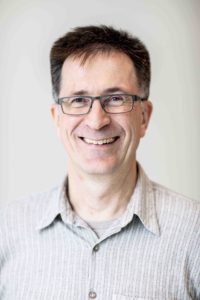
Karl Böhringer has three decades of experience in microfabrication, microrobotics and biomedical microdevices. He established the Microelectromechanical Systems (MEMS) Laboratory at the University of Washington, and he is the founding director of the Nano-engineered Systems Institute (NanoES), one of 16 nodes in the NSF National Nanotechnology Coordinated Infrastructure network. The mission of NNCI is to provide access to cutting-edge nanotechnology equipment and training to academic and industrial researchers and to transfer the latest scientific advances to applications in engineering and medicine. Dr. Böhringer’s research focuses on low-cost portable, wearable and implantable diagnostic devices, self-assembly for heterogeneous integration of microsystems, and MEMS metasurface optics. He co-invented anisotropic ratchet conveyors, which provide a low-cost platform for processing liquid samples in portable devices. This patented technology was featured on the cover of Advanced Materials.
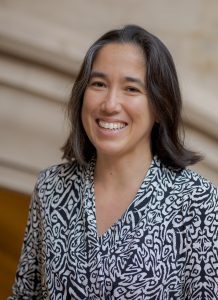
Kai-Mei Fu directs the Quantum Defect Lab, which performs research on the synthesis, characterization, control and device integration of optically active quantum defects in crystals for applications in quantum networks and sensing. Kai-Mei has advised over 30 undergraduate research projects including 9 undergraduates who have co-authored publications and 6 women who have continued on to graduate studies in Electrical Engineering or Physics.
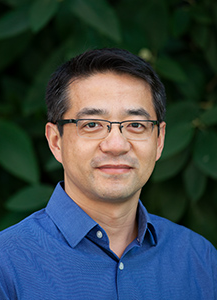
Mo Li directs the Laboratory of Photonic Devices, which carries on a broad range of projects on integrated photonic devices, optoelectronic materials, and quantum systems. One of the group’s recent focus has been on photonic computing systems as hardware accelerators for machine learning and AI, by utilizing the high speed/bandwidth and low power consumption advantages of optical communication. Specifically, the group are building on-chip programmable photonic systems co-integrated with microelectronics to achieve low-latency, high computation capacity for AI/ML on the cloud or at the edge. Mo has mentored more than 20 undergraduate students in the past ten years through various REU and REM programs at the University of Washington and the University of Minnesota. Notable examples of participants include Johnny Ramirez, a Hispanic student from the University of Texas, El Paso and Grace Pardini, a female incoming freshman of the University of Washington.
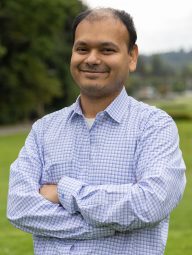
Arka Majumdar directs the Nano-Optoelectronic Integrated Systems Engineering lab, which carries on a broad range of projects on photonic integrated circuits, meta-optics, quantum photonics and reconfigurable optics. One of the group’s recent interests is developing phase change material integrated silicon photonics, a project currently being partially supported by Intel. Arka has mentored more than 30 undergraduate students in the past ten years through various REU and REM programs at the University of Washington. Many of these students went to pursue graduate education of joined semiconductor industry after they finished their undergraduate studies.
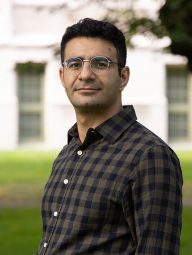
Sajjad Moazeni is the director of the emerging integrated technologies (EMIT) Lab. EMIT Lab develops large-scale and energy-efficient integrated systems with applications in computation and communication, sensing and imaging, and life sciences by merging state-of-the-art electronics with photonics and other emerging technologies. One main research thrust in our lab is to boost the compute power of supercomputers and data-centers using optical interconnects and computing schemes for AI/ML applications. Additionally, we are developing new tools for neuroscientists to better understand the brain and discover new computing paradigms. Sajjad has mentored multiple undergraduate researchers at UW and also during his PhD at UC Berkeley. This includes two students in an REU program, and one female student during 2017-18 who is admitted to the Stanford PhD and is now a postdoc at Columbia University.
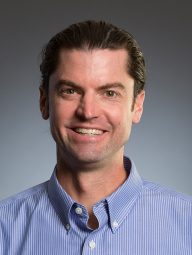
Chet Moritz directs the Restorative Technologies lab that develops and tests systems and algorithms for interfacing with the brain and spinal cord to restore function after injury. They are advancing our understanding of how brain circuits can change in response to using a Brain-Computer Interface. They have further demonstrated that neural activity can be decoded from the brain in real-time to control stimulation of paralyzed muscles or the spinal cord below the injury. REU students will gain hands-on experience in our animal lab recording from the brain, and also stimulating the brain and spinal cord in real-time using electrical and optogenetic stimulation. Ongoing human trials provide additional experiences for students in exciting applications of neurotechnology for people with brain or spinal injury. Chet has enjoyed mentoring 53 undergraduate researchers in his lab, including 8 summer REU students (Fig. 4). He also mentored 9 high school students in an NSF Young Scholars program, and 6 high school teachers in an NSF Research Experience for Teachers (RET) program. Chet is proud to have published 14 journal papers with undergraduate co-authors. Chet served as the co-director of the Engineering Research Center (ERC) in Neurotechnology, and actively supported the REUs in our supplement program, as well as winning other supplements to support new DEI workshops. To further a culture of inclusion, Chet visits partner campuses such as Spelman University, and engages with native tribes in Washington to build a pathway for tribal youth.
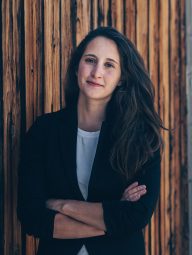
Sara Mouradian directs the Scalable Quantum Research Lab which builds quantum technologies at the scale useful for real-world applications. In particular, the lab focuses on the engineering challenges surrounding trapped-ion quantum technologies. We tackle all aspects including optical control with integrated photonics, optimization of multi-qubit gates, and fabrication of next-generation trap designs. Sara is committed to fostering a diverse and inclusive research environment that cultivates innovation, creativity, and well-being. She has mentored many undergraduates, including two women who continued on to pursue PhDs in physics.
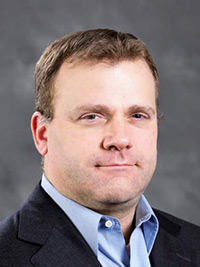
Chris Rudell has over 30 years of experience (4 with Intel Corp) in the semiconductor industry, designing integrated circuits and systems for both commercial and research applications. He currently directs the Future Analog Systems Technology (FAST) Lab. After finishing his PhD, he worked as an RF IC designer at Berkana Wireless (now Qualcomm), and Intel Corporation. In January 2009, he joined the faculty at the University of Washington as an Associate Professor. He is a member of the Center for Neural Technology (CNT) and serves as the co-director of the Center for Design of Analog-Digital Integrated Circuits (CDADIC). Lastly, he has recently been accepted into Intel 16nm Technology University Shuttle Program. Chris’ FAST Lab has participated in the CNT REU summer program. Three notable success stories include one female undergraduate who is currently defending her PhD at MIT in the photonics area. Another undergraduate REU participant, who is a member of the LGBTQ community, is completing his PhD in the bioelectronics area at Rice University; he is currently exploring faculty positions. The third student is now completing his PhD in the area of digital VLSI under Bora Nikolic at UC Berkeley.

